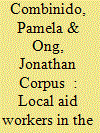| Srl | Item |
| 1 |
ID:
178519


|
|
|
|
|
| Summary/Abstract |
This article explores inter-caste/religious (ICR) marriages in Kerala (South India) and focuses on the meanings and experiences of kinship when the latter is devoid of its expected emotional and relational substance, to become a ‘public fiction’. With this expression, I refer to kinship relations accepted in the public sphere, but which denied affective and material foundations in the everyday life. ICR marriages hold an important socio-political role in Kerala as symbols of the State’s development, and family ostracism is scrutinised as a form of backward communalism. However, relatives are not always willing to build relations with ICR kin. This leads to ICR families managing situations where public kinship tolerance co-exists with the negation of its real emotional and intimate possibilities. The article maps how the reality of ICR marriages is turned into a fiction by persisting unspoken norms. It suggests the importance of linked discussions on fiction/ reality in the domestic sphere to the public/political role that kinship and families hold in modern postcolonial Kerala.
|
|
|
|
|
|
|
|
|
|
|
|
|
|
|
|
| 2 |
ID:
157943


|
|
|
|
|
| Summary/Abstract |
This paper examines the experiences of Filipino workers recruited for technology and communications work by international aid agencies involved in the Typhoon Haiyan response. Filipino workers, many of whom were personally coping with the social and economic impact of this disaster, were hired on short-term contracts to test and implement various digital humanitarian innovations such as feedback and hazard mapping technological platforms. These workers were doubly marginalized: first, as tech workers whose work was viewed by aid officers on the ground as less substantial than that of food or shelter programs; and second, as local voices often drowned out by national and international colleagues. Moving beyond the usual figure of the cosmopolitan and adventure-seeking Western humanitarian acting on distant suffering, this paper draws attention to local aid workers’ aspirations for personal and professional mobility as they seize novel opportunities opened up by the digital humanitarian agenda. It outlines how the digital humanitarian project’s ambition to facilitate the inclusion of disaster-affected communities is fundamentally undermined by labor arrangements that doubly marginalize local aid workers.
|
|
|
|
|
|
|
|
|
|
|
|
|
|
|
|